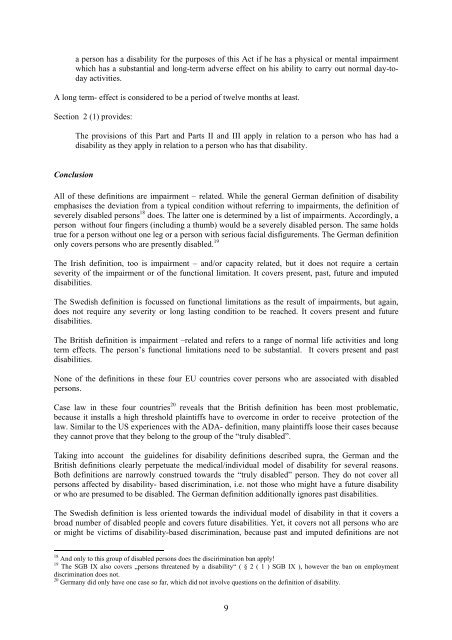Definition of disability
Definition of disability
Definition of disability
You also want an ePaper? Increase the reach of your titles
YUMPU automatically turns print PDFs into web optimized ePapers that Google loves.
a person has a <strong>disability</strong> for the purposes <strong>of</strong> this Act if he has a physical or mental impairment<br />
which has a substantial and long-term adverse effect on his ability to carry out normal day-today<br />
activities.<br />
A long term- effect is considered to be a period <strong>of</strong> twelve months at least.<br />
Section 2 (1) provides:<br />
Conclusion<br />
The provisions <strong>of</strong> this Part and Parts II and III apply in relation to a person who has had a<br />
<strong>disability</strong> as they apply in relation to a person who has that <strong>disability</strong>.<br />
All <strong>of</strong> these definitions are impairment – related. While the general German definition <strong>of</strong> <strong>disability</strong><br />
emphasises the deviation from a typical condition without referring to impairments, the definition <strong>of</strong><br />
severely disabled persons 18 does. The latter one is determined by a list <strong>of</strong> impairments. Accordingly, a<br />
person without four fingers (including a thumb) would be a severely disabled person. The same holds<br />
true for a person without one leg or a person with serious facial disfigurements. The German definition<br />
only covers persons who are presently disabled. 19<br />
The Irish definition, too is impairment – and/or capacity related, but it does not require a certain<br />
severity <strong>of</strong> the impairment or <strong>of</strong> the functional limitation. It covers present, past, future and imputed<br />
disabilities.<br />
The Swedish definition is focussed on functional limitations as the result <strong>of</strong> impairments, but again,<br />
does not require any severity or long lasting condition to be reached. It covers present and future<br />
disabilities.<br />
The British definition is impairment –related and refers to a range <strong>of</strong> normal life activities and long<br />
term effects. The person’s functional limitations need to be substantial. It covers present and past<br />
disabilities.<br />
None <strong>of</strong> the definitions in these four EU countries cover persons who are associated with disabled<br />
persons.<br />
Case law in these four countries 20 reveals that the British definition has been most problematic,<br />
because it installs a high threshold plaintiffs have to overcome in order to receive protection <strong>of</strong> the<br />
law. Similar to the US experiences with the ADA- definition, many plaintiffs loose their cases because<br />
they cannot prove that they belong to the group <strong>of</strong> the “truly disabled”.<br />
Taking into account the guidelines for <strong>disability</strong> definitions described supra, the German and the<br />
British definitions clearly perpetuate the medical/individual model <strong>of</strong> <strong>disability</strong> for several reasons.<br />
Both definitions are narrowly construed towards the “truly disabled” person. They do not cover all<br />
persons affected by <strong>disability</strong>- based discrimination, i.e. not those who might have a future <strong>disability</strong><br />
or who are presumed to be disabled. The German definition additionally ignores past disabilities.<br />
The Swedish definition is less oriented towards the individual model <strong>of</strong> <strong>disability</strong> in that it covers a<br />
broad number <strong>of</strong> disabled people and covers future disabilities. Yet, it covers not all persons who are<br />
or might be victims <strong>of</strong> <strong>disability</strong>-based discrimination, because past and imputed definitions are not<br />
18<br />
And only to this group <strong>of</strong> disabled persons does the discirimination ban apply!<br />
19<br />
The SGB IX also covers „persons threatened by a <strong>disability</strong>“ ( § 2 ( 1 ) SGB IX ), however the ban on employment<br />
discrimination does not.<br />
20<br />
Germany did only have one case so far, which did not involve questions on the definition <strong>of</strong> <strong>disability</strong>.<br />
9
















